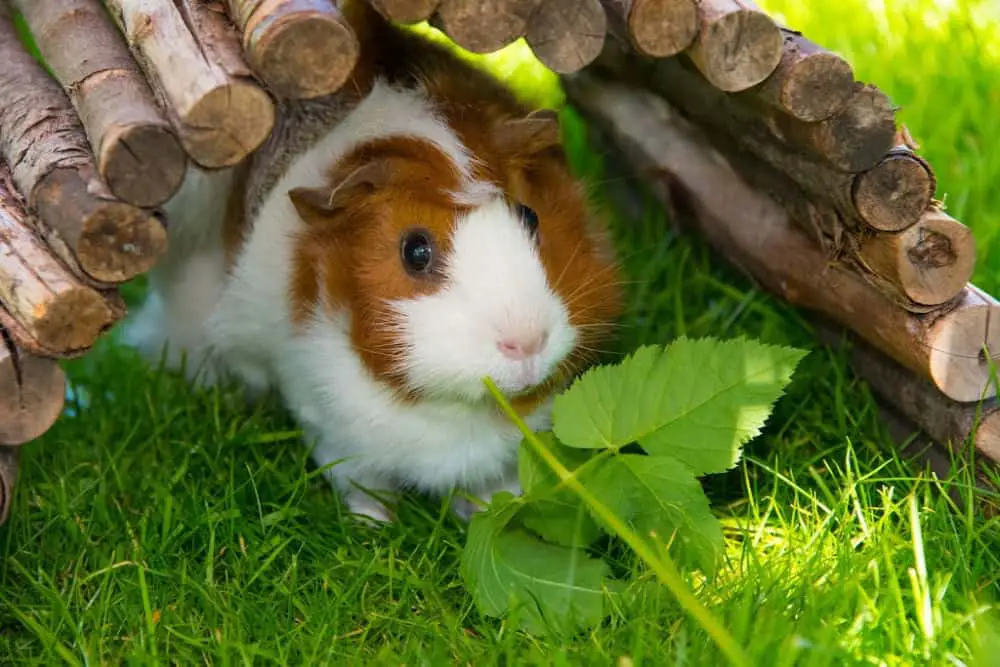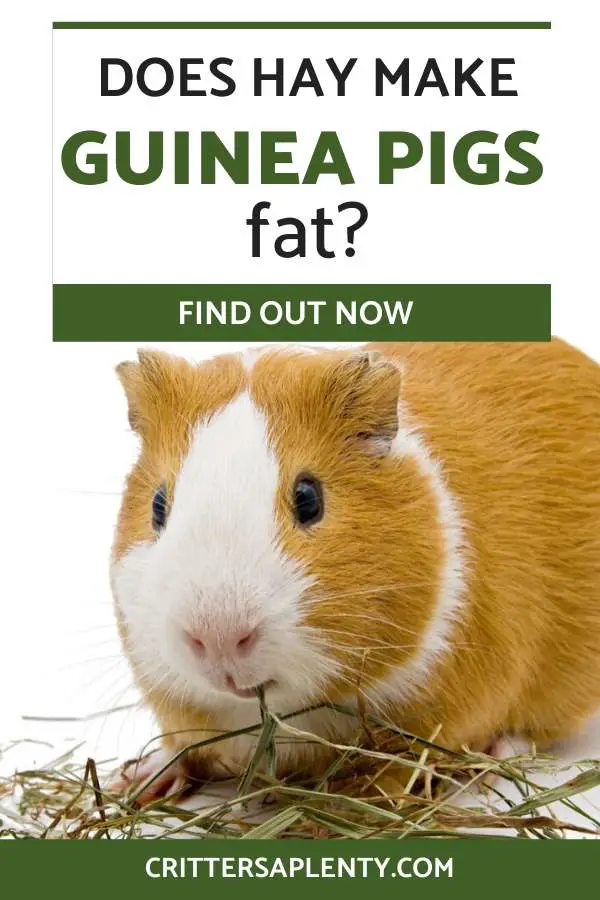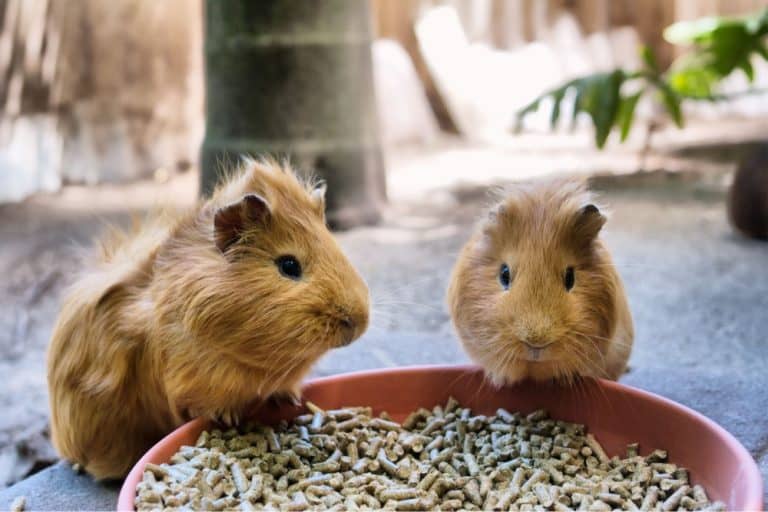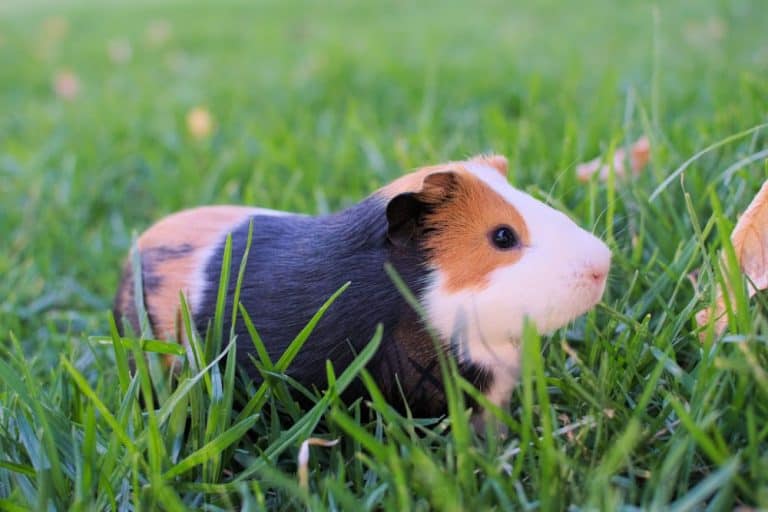A Guinea Pigs Diet and What Makes them Overweight
Are you the owner of a guinea pig? Perhaps your guinea pig is starting to put on weight, and you’re interested in finding out what causes this. Some owners worry that hay may be making their guinea pig fat. This is unlikely to be the case as hay is an essential part of a guinea pigs’ diet and something that they should be fed regularly.
This article will look at the types of food you should give your Guinea pig and how to reduce the likelihood of them becoming obese.
Does Hay Make Guinea Pigs Fat?
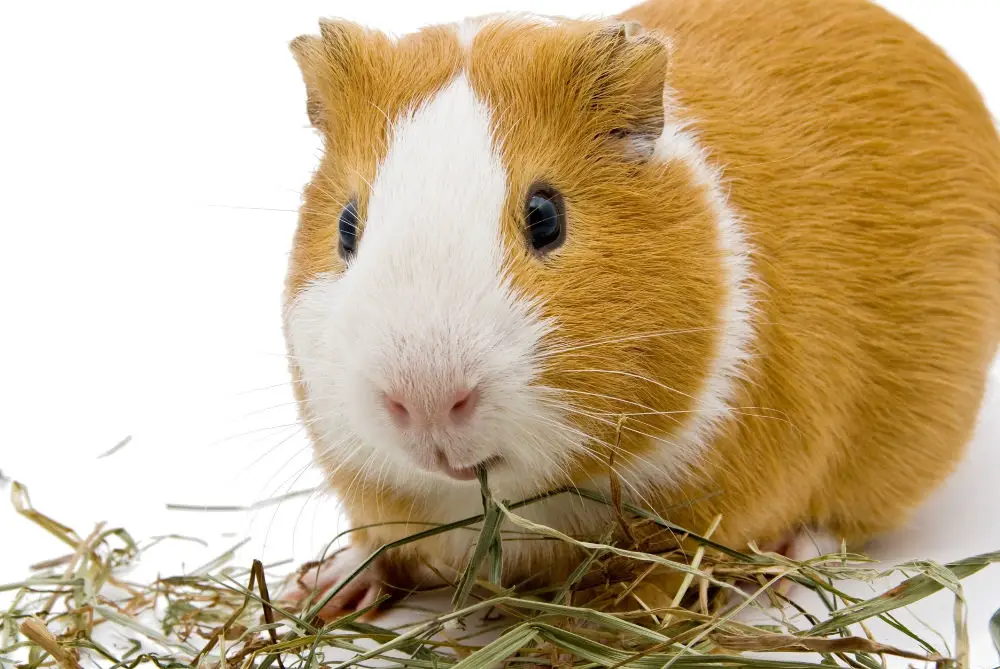
It’s unlikely that your guinea pig has put on weight because of overeating hay. As with most other creatures, guinea pigs become overweight if they consume too much of the wrong foods and don’t get enough exercise. A guinea pig’s diet should consist of 75% Timothy hay or orchard grasses.
You can feed your guinea pigs as much hay as they need. Timothy hay should be in plentiful supply in the guinea pigs’ hutch as these animals also use it for bedding and seem to be constantly nibbling.
Guinea pigs require a diet that’s high in fiber, and the primary way for them to get enough fiber is to eat plenty of hay. Guinea pigs, like all rodents, also have teeth that are continually growing, and they need to gnaw on hay and other things a lot to keep their teeth in good shape.
Hay is also good for your guinea pig as it improves their digestion and gives them essential nutrients, which keeps them healthy. You don’t need to worry that you are feeding your guinea pigs too much hay. If your guinea pigs are overweight, it’s likely to be because of an abundance of the wrong foods or a lack of exercise.
Timothy hay or orchard grass hay offered in unlimited quantities daily is better than alfalfa. Alfalfa hay is a richer type of hay with higher amounts of protein and calcium. It should only be fed to growing guinea pigs under four months of age, or for guinea pigs who are sick, pregnant, or lactating, as it provides them with the extra nutrition that they need. You can occasionally offer small amounts of alfalfa hay as a treat.
If you’ve been feeding your guinea pigs large quantities of alfalfa hay, it may have contributed to your piggies getting fat. You could try switching to Timothy or grass hay to see if that makes a difference.
How to Care for a Guinea Pig
Guinea pigs need to eat a balanced diet that contains hay, a guinea pig food mix that has been formulated especially for these animals, and some fresh greens or carrots. They can also be given some treats, such as a little apple, in moderation.
Some owners go a bit overboard and feed their pets too much; fat guinea pigs are not healthy. It is sometimes difficult to tell if your guinea pig is overweight and needs to be put on a diet as these rodents have solid little bodies.
Guinea pigs should also have access to sticks and bark to gnaw on; this will stop them from chewing the sides of their hutch and help them wear down their teeth. You should choose wood from fruit trees, such as applewood, and make sure that it’s adequately cleaned before giving it to your pet.
How to Tell If Your Guinea Pig Is Fat
Determining if you have an overweight guinea pig can sometimes be tricky as their bodies are naturally round, and some animals are bigger then others. In general, a male guinea pig should weigh between 900 and 1,200 grams, and females are slightly smaller at 700 to 900 grams.
You may like to buy a small scale for weighing your guinea pig; this is especially useful if you’re worried that your piggie is overweight, or if you are putting it on a diet. You can give your pet regular weigh-ins to determine how effective any changes in their diet have been. Make sure to buy a gram scale that can weigh in smaller increments, as this will help you to get an accurate measurement of your pets’ weight.
You can also tell if your guinea pig is fat by observations. Check whether your pet is walking normally or whether it seems quiet and lethargic. You can also look at your pet from above. An overweight guinea pig will have bulging sides; if you notice anything that worries you, its essential to seek advice from a vet before your pet health suffers.
If your guinea pig has suddenly gained weight, it could signal that it is pregnant or has a medical problem, such as a tumor. Some guinea pigs also suffer from bloat if they are fed an incorrect diet. Bloat is a condition where the abdomen becomes distended and is a severe problem that needs immediate veterinary care.
It would be good to take your guinea pig to the vet, even if you suspect it’s just overweight. The vet can rule out any medical problems and advise you on the best type of diet for your pet.
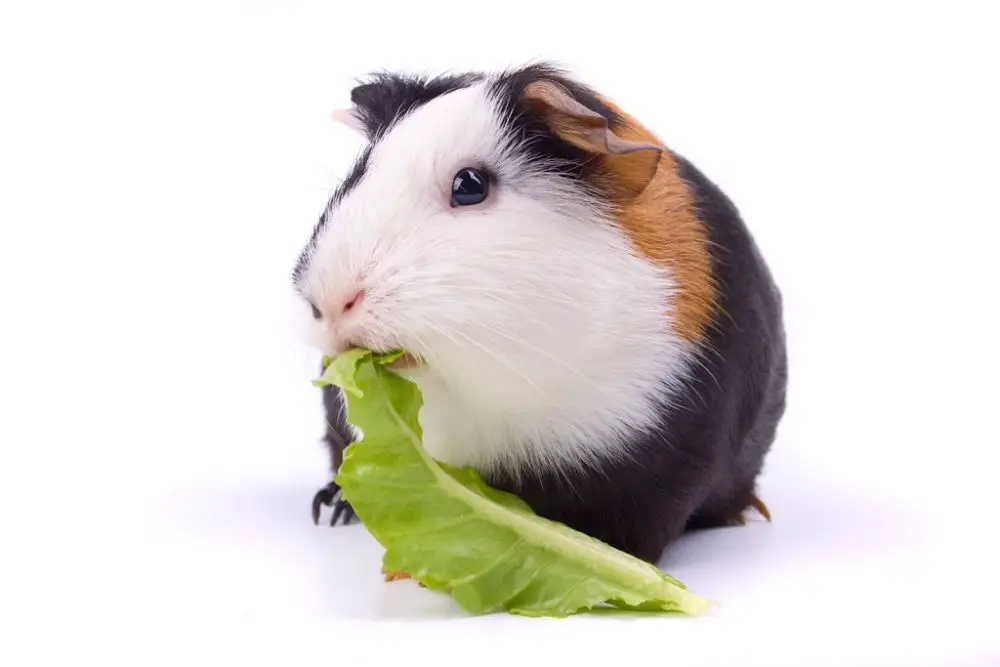
What Should Guinea Pigs Eat?
Guinea pigs should be fed plenty of hay and also need a proper guinea pig pellet mix. These pellet mixes are specifically designed to meet the nutritional needs of guinea pigs and are fortified with vitamin C.
It’s essential to feed your pets the right food as guinea pigs are unable to produce their own vitamin C. If they become deficient in this vitamin over a long period, they can become very sick.
Guinea pigs can also be given vegetables and occasionally fruit. These help to add additional nutrients to their diets. Guinea pigs especially like carrots, green leafy veg and can have fruit in limited amounts.
Foods that Guinea Pigs can have as a Treat
You may like to give your guinea pig a treat now and again as this will help add variety to your pets’ diet and will also help you bond with your animal. You should carefully select the treats you give your guinea pig to ensure that they aren’t harmful to your pet’s health. Treats should only be offered occasionally in tiny amounts as guinea pigs who eat too many treats are more likely to get fat. To a guinea pig, anything that’s provided by their owner by hand is a treat.
You can try offering fruit and veggies in small amounts—Guinea pigs like little chunks of apples or dandelion leaves.
Foods to Avoid
Your guinea pig shouldn’t be given foods that contain high amounts of sugar; this includes fruits. It can be ok to give your pet a little fruit in small quantities, but these shouldn’t be regular parts of their diet. You’ll also want to avoid foods that are high in calcium and oxalic acid, as these can lead to calcium and bladder stones. Guinea pigs shouldn’t eat nuts as these are fattening.
Some foods, such as avocado and grapes, may seem healthy but actually poisonous to many pets. It would be best if you also didn’t give your guinea pig any human foods like cake or potato chips.
Exercise
If your guinea pig has issues with its weight, you’ll need to ensure that it gets enough exercise and changes to its diet. It would help if you gave your pets adequate playtime out of their hutch as this gives them a chance to run around and bond with you.
You may also like to experiment with hiding your guinea pig’s food around the hutch, which means that it’s more active and has to look for food.
Conclusion
Hay makes up a big part of your guinea pigs’ diet, and you shouldn’t worry that your pets are overeating hay. Providing a nutritional diet to your guinea pigs is the best way to keep your guinea pigs healthy. It would help if you also allow your pet time out of its hutch to run around and play.
If your guinea pig has recently put on or lost weight quickly, you should consult a vet as this could signal that there’s a medical problem. Changes to your pets’ diet should be made gradually, and you should consult your vet about the changes you’re making. They will help you to come up with a weight loss plan for your pet.
Related Questions
How can I fatten up my guinea pig?
If you have a malnourished, sick, or underweight guinea pig, you can temporarily provide them with alfalfa hay. Or an alfalfa-based pellet, such as KMS or Oxbow, they both have an alfalfa-based pellet version that is commonly used for younger animals. You can also try adding water to either alfalfa cubes (compressed hay cubes) or alfalfa-based pellets to create a mush that might encourage piggies with a poor appetite to eat.
How much hay should a guinea pig have a day?
The average guinea pig will need roughly 1 oz (28 grams) of hay per day. This amount of hay will be more than enough to provide your guinea pig with plenty of roughage in their diet.

